Thinking and Preparing for the Future-Now in East Hampton, Long Island, New York, North American Continent, Planet Earth, Milky Way . . .
We are living in non-normal times! Not abnormal: non-normal! Someplace in-between here and there. What I suppose could be called “aporetic” (Gk. “betweenness”). 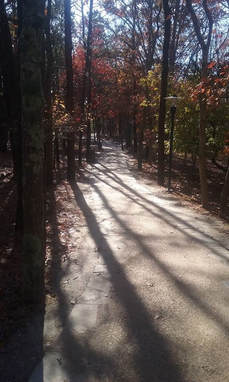
Across 2016 and half of 2017 I was able to walk a path at the Ross School. Every day. Somewhere between the Center for Well Being (photo 1)(photo 2) and the Nike Statue at the Ross Upper School I found myself living inside the great pause: a fermata moment in my life and writing that reminded me of the coming world revealed to Martin Heidegger at the end of Contributions to Philosophy: Ereignis.
The Path, Ross School
loading...
It was a singular experience, as was everything Ross. I lived inside this strange event called Election 2016 while teaching seventh and eighth graders philosophy; tenth graders literature, writing, and Uber-reading; and adding my voice to the Ross Learning System (RLS) by way of interdisciplinary philosophy and a love of thinking (philosophy is the art of cunning, the love of the game of thinking) with students and families, faculty and staff, and a leadership team poised to enervate the world with a planetary mission and vision. (Planetary means we start with the assumption that we are all part of one ecosystem, one digital and terrestrial system; it is not enough to say “we are the world” when the “world” is presumed to be way out there rather than immediately available and accessible right here, right now, in our own bodies, minds, and institutions.)
Somehow Courtney Sale Ross and her various teams, with over two decades of expertise, wisdom, experiments, successes, setbacks, and all that goes with changing the world: somehow, the world is now ready for the most non-normal of world-views expressed by a media legend from within a beacon to the world called Ross. The RLS, as it’s called, is an ark built for this moment.
For ten months, the conversations at the Ross Café or in study areas near the astonishing koi pond or across from the CWB in the Senior Building (Photo 1)(Photo 2) with its history of art and artifacts and student projects on full display or in parking lots underneath some of my favorite pine trees in the world: honestly, we all felt both prepared for this moment and deeply displaced, in an intellectual and creative refugee sort of way. There was also a very real sense of dread in the air that went far beyond new Presidential priorities or an increased police presence in the Hamptons (e.g., migrant workers and Dream Act kids are everywhere).
RCB outside Ross Cafe
I said often to my students, “This is a last stand. This curriculum. This woman’s vision. Anticipated by two decades. Positioned to help not just educators but leaders around the world. I know this is going to sound strange but I think the RLS is metabolic, not just curricular. It helps me breathe and think and live because it engages who we are right now. It is human so it will need guidance and care; without some kind of nurturing and deep love of learning and intellectual exploration, the system will fail. That is not an option.”
At the moment, humanity encounters a sense of displacement across local, regional, national, and international cultures (including the digital second life) in ways that carry strong parallels to early modern historical transitions as well as Renaissance encounters with new technologies, communications, and logistics (Rifkin). The question now remains: What is to be done?
We can’t simply rely on old systems; they have crashed or have burned or are about to crash and burn. Any desire or attempt to have “stayed timeless time,” otherwise known as “eternal” or “above it all” no longer seems viable in non-normal times. It is clear, then, given the last six or seven centuries that the road to planetization (William Irwin Thompson, founding Ross School visionary) has been more chaotic than ordered. More burning than healing. This must change, or humanity will not make it into the 22nd century thereby ending what Thompson calls the evolution of consciousness.
Courtney Sale Ross
History is not on our side. We are all at risk of being forgotten or simply obliterated by means both nuclear and stupid.
What we consider the great events (or the fictitious “rise” in the “rise and fall” theory of history perfected by Gibbon) are more accurately described as moments of “territorialization” in Deleuze and Guattari’s A Thousand Plateaus. Peaks on icebergs that are fast melting away. That is, when we consider the First Industrial Revolution, the Antebellum decade in American letters, or the “postmodern age,” for example, we tend to assume a line of cause and effect that concludes in great cultural and artistic heights. Instead, the Ross curriculum looks for ebbs and flows, threads and knots. Mrs. Ross and her teachers asked instead: How can we become the angel of history that stands inside the maelstrom but looks both to the past and the future for a way to live fully, to think critically, to dream out loud again. And again.
H. G. Wells wrote that “civilization is in a race between education and catastrophe. Courtney Sale Ross challenged us at the School and Institute (especially the students) to learn the truth and spread it as far and wide as our circumstances and abilities allow. Wells, a tacit mentor for Mrs. Ross, continues: “For the truth is the greatest weapon we have.” Said differently, education encourages not only deeper and wider understanding of pressing personal and societal problems but also inspires courage in a way that matches Ross core values. No wonder so many state and private systems fear the non-normal. No wonder the Ross model has come under fire over the years for its expense and its expanse. This is a planetary shift in priorities, values, and world-views.
Mrs. Ross (in her mystical, philosophical way) called me into her world to deliver the most important challenge of my life since Lady Gaga and I collaborated on Thoughtrave. Mrs. Ross argues that we must create new relationships with our students and each other as colleagues so we can deal with this moment, right now, at the threshold between nothing and everything.
One moment stands out of the many I’ve been stringing together for months now in my post-Ross dasein. Not the interactive text/improvisation Tartuffe Moliere and automatic writing sound design experiment. Not the find-a-new- meme-every-five-minutes philosophy exercise. Not the dada meets Goethe (goooootahhhhh) jazz performance meets Robert Wilson time/space explorations. Nope. It was the Future-Now event that still resonates as the most “Ross-like” moment last academic year during the Election Teach-In.
Mrs. Ross insisted the school take a pause (what I called a “fermata”). And while this decision caused a lot of tension (taking a day to switch curricula is always a challenge!) the faculty, students, parents, and staff rallied to create what will be for me an “eventual” moment unlike anything since learning about “the event of being” from Alain Badiou during a long dinner conversation in August 2008 at the European Graduate School.
At the end of the teach-in, the students were gathered in the High School library and guided by me (with a film crew, I might add, which is always strange) through rapid fire prompts asking a simple question: imagine the world of the future. (Yes, Dr. Baum. The Future.) Write what you hear or see or smell or touch or feel in that very Heidegger “thinking of thinking” way. Project five seconds into the imagined future. Start with the future in five minutes. Then, five hours. Five days. Five weeks. Five months. Five years. Five decades. And last: five centuries. What does the world look like? Are you there? Are you alive? If so, how are you there? Are you alive? Are you Artificial Intelligence? Are you a ghost in the system? And entry in the archives? Forgotten?
Students from the ninth and tenth grade classes expressed both great pessimism and optimism about the future. For some, Brazil was going to rise and become a world leader like Russia, China, Germany, and the United States. For one student, the future was already here by way of clowns showing up in communities scaring people: “They are only scary because we don’t speak their language; in the future, everyone will be a clown.” The most pessimistic outcomes were offered by young women fearing a future where their voices aren’t heart and opinions (like their bodies) still disrespected. Most teenage boys believe the world would end in five years.
Some projected with great detail the post-nuclear fate broadcast across media in the 1980s: what I grew up with. Others saw this as a purging of the world, inviting new life in the post-apocalyptic world. New species. No humans. Maybe humans living on the moon or colonizing Mars.
We all surprised ourselves; especially one Chinese female student who had a simple story to tell. She repeated the phrase, “and everyone was happy; everything was okay.” The room was confused. I was confused. She just simply smiled.
“Are you sure?” I asked. “Absolutely, Dr. Baum. I am sure everything will be alright.” I stood in silence for a good minute. No one said a word. She just kept smiling, whispering a quiet yet proud, “yeah” while displaying a victorious affirming head knod like a proud third grader.
loading...
Philosophy often times surprises everyone. Yet, while brilliant, useful, and inspiring, the H. G. Wells quote (and the Ross mission and vision) needs slight transposition, a way to be heard now inside a more atonal, postmodern cacophony of problems. Confusion in today’s world should be seen as non-normal, part of the every day practice of trying to live.
In our educational response to this “race between education and catastrophe,” it is absolutely necessary to position our students and our teachers inside this maelstrom so they can learn about it with courage and curiosity rather than run away from it or merely cower and cry. I believe this is what happened on “Election Teach-In.” In order to meet the future, let alone activate future memory, it seems important to take a survey of right now (or project in fives, like we did together). It was necessary to encounter the uncomfortable and happy truths that defined that pre-Election day moment so we could compare and contrast past and future experiences. Mrs. Ross pushed us to make that moment happen; this is what she does: she sees the path, encourages others to follow her travels, asks for input from everyone, and then makes decisions. She is, ultimately, a teacher, a philosopher, and someone I am quite convinced, like Lady Gaga, has arrived here in this moment ahead of us so she could guide us through the most harrowing and depressing moments of our human consciousness.
It’s important to remember (as Socrates taught in Plato’s “Cave”) how terrifying truths frighten easily frightened people, generations of humans living on a planet they still think they can manipulate, control, rejuvenate, harness, modify, abuse, delight. Like the hopeful student with the defiant smile, we need to not frighten so easily. Is this not the heart of the Ross School mission and vision? To create a space where everyone can train for the future-now? Is this fearlessness not exactly what becoming a philosopher has meant to me, my students, the world I am quite sure will end in a twitter not a bang.
So, when we talk about the future, we are searching for another modality of thinking that has yet to be materialized. 2050 may be difficult to imagine but 2018 is not so far away. Same for 2020. If we are speaking from the future—the slight or distant future—we are activating neurological networks that enervate past, present, and future in creative and critical ways. Nothing teaches faster and more furious than immediacy.
This is a sad day for me. I now live and work in Washington, DC. I am very far from the woman and school who affirmed everything my life as a philosopher stands for, especially the freedom to think and live in the world without hesitation or obstruction. Today, a gunman opened fire on twenty-two thousand people attending a Las Vegas country music festival. Today Tom Petty died. Today I was shocked into this moment again. No path. No library. No students. But, now, I walk a different path in a different city leading me to the places I once called home: the Crypt Church, the Franciscan Monastery, the National Mall, Dupont Circle, the nastiest and most glorious Chinese food in the city.
We will want to turn away: fly away from this moment. Ignore immediate questions. Become Facebook warriors, armchair quarter backing the event with our pro-this and con-that. Some will simply want to just weather the storm rather than chart a course directly into the heart of darkness (or back to shore if the conditions change). Dread is expected. Dread is a fact. (This is Jean-Paul Sartre 101.) But, Courtney Sale Ross encouraged us -- everyone, student and teacher alike -- to live a creative life with courage. We encounter what we fear in order to understand what is unknown. Mindfulness teaches us to evaluate our abilities and our needs; to sit with both inside a non-competitive arena called dharma. Sharing our insights (and our fears) allows others to feel welcome inside the temporary shelter inside the history of consciousness we have built for this moment.
We are ready!
I hope.
Contributor:
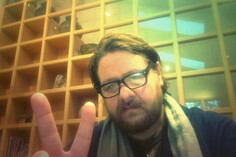
Robert Craig Baum is a philosopher, screenwriter, producer, fancy entrepreneur, philanthropist, and master teacher with Humanities and Liberal Arts credentials spanning more than two decades. He holds degrees from Catholic University, Dartmouth College, and the European Graduate School. He lives in Washington, DC area with his wife and four boys.
He misses the ocean.
loading...
0 Comments
Leave a Reply. |
Steven Craig Hickman - The Intelligence of Capital: The Collapse of Politics in Contemporary Society
Steven Craig Hickman - Hyperstition: Technorevisionism – Influencing, Modifying and Updating Reality
Archives
April 2020
|
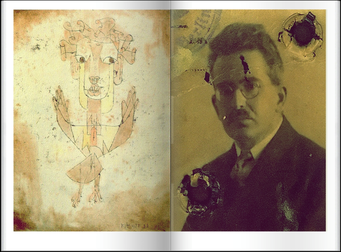
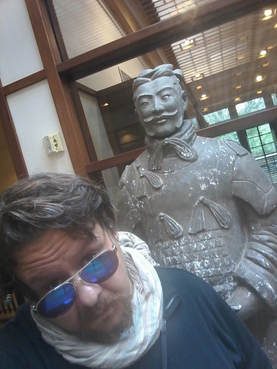
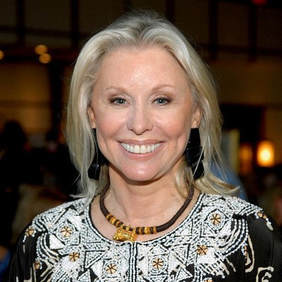
 RSS Feed
RSS Feed
